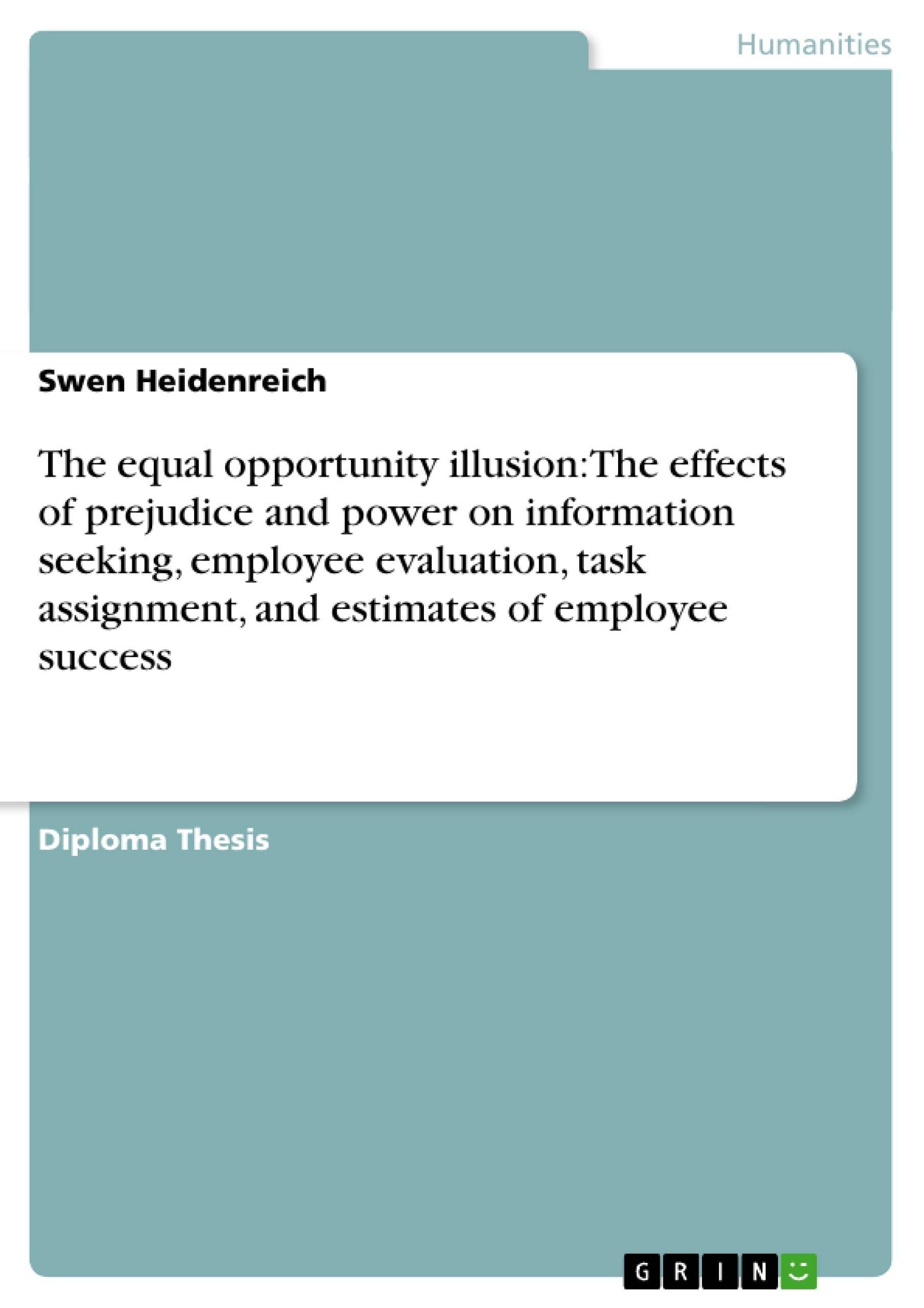This study tested the effects of individual variables (prejudice level) and situational factors
(power instructions) on information seeking strategies, employee evaluation, estimation of
likely success, and task assignment in an employer – employee, ethnicity relevant
experimental design, with subjects always assigned the role of employer and an ostensibly
other person (a same gender black individual depicted in a photograph) assigned the role of
employee. Subjects (N=60) were categorized into groups that varied on power (exclusive or
inclusive leadership instruction) and prejudice (quartile split of MRS scores). Participants
were asked to select a subset of questions and tasks from various lists for the ostensibly other
subject to answer. Participants at a later point in the experiment rated selected questions and
tasks. At the end of the experiment the participants were asked to give a final employee
evaluation and estimation of likely success for a future project. Next to the attempt of replicating generally accepted and expected interrelations of power and prejudice with certain attention (information – seeking) strategies and the use of
stereotypes and their effect on evaluation and estimation, one of the main focuses of this
study is on the effects of the above variables on behavior (final task assignment).
Consistent with predictions participants with a low prejudice level assigned more
valued tasks, focused more on strength of the employee and estimated greater employee
success than did high prejudice participants. Also participants with inclusive leadership
instructions assigned relatively more skill tests with supporting help and estimated greater
employee success than participants with exclusive leadership instructions. Interaction -
effects across the skills test- information seeking-, employee evaluation-, final task
assignment-, and estimated success- variables showed that high prejudiced participants in the
exclusive leadership style condition respond in stereotype consistent ways significantly more
often than participants in the inclusive leadership condition and low prejudice participants. The Equal Opportunity- Illusion: The effects of prejudice and power on information seeking, employee evaluation, task assignment, and estimates of employee success
The front page of the New York Times on Friday, March 30th 2001 read “California
Census Confirms Whites Are In Minority – State now most diverse”. [...]
Inhaltsverzeichnis (Table of Contents)
- Acknowledgements
- Abstract
- Introduction
- Method
- Results
- Discussion
- References
- Author's Note
- Tables
- Appendices
Zielsetzung und Themenschwerpunkte (Objectives and Key Themes)
This study aims to investigate the influence of individual prejudice levels and situational power dynamics on various aspects of employer-employee interactions. The study focuses on how these factors affect information seeking strategies, employee evaluation, task assignment, and estimates of employee success in an ethnicity-relevant experimental setting. The experiment involves participants assuming the role of employers while interacting with an ostensibly black employee depicted in a photograph.
- The relationship between prejudice levels and information seeking strategies
- The impact of power instructions on employee evaluation and task assignment
- The effects of prejudice and power on estimations of employee success
- The role of stereotypes in influencing employer behavior
- The interaction effects of prejudice and power on information seeking, employee evaluation, task assignment, and estimated success
Zusammenfassung der Kapitel (Chapter Summaries)
- Introduction: This chapter sets the stage for the study by discussing the prevalence of social stratification and the enduring nature of power imbalances among ethnic groups. It highlights the growing diversity in the United States and the need to understand how prejudice and power influence workplace interactions.
- Method: This chapter provides a detailed description of the experimental design, including participant recruitment, manipulation of power instructions, the measurement of prejudice levels, and the specific tasks assigned to participants.
- Results: This chapter presents the quantitative results of the study, focusing on the relationships between participant prejudice levels, power instructions, and their impact on information seeking, employee evaluation, task assignment, and estimated success.
Schlüsselwörter (Keywords)
The study's main keywords and focus topics include prejudice, power, information seeking, employee evaluation, task assignment, estimated success, stereotypes, social stratification, and ethnic diversity.
Frequently Asked Questions
How does prejudice influence employee evaluation?
The study shows that high prejudice levels lead to more negative evaluations and lower estimates of success for employees from minority backgrounds.
What is the "Equal Opportunity Illusion"?
It refers to the discrepancy between the ideal of equal opportunity and the actual impact of individual prejudice and situational power on workplace decisions.
How do inclusive vs. exclusive leadership instructions affect task assignment?
Participants with inclusive instructions assigned more skill tests with support, whereas exclusive instructions often led to stereotype-consistent behaviors in high-prejudice individuals.
What was the methodology used in this experiment?
Participants acted as employers selecting questions and tasks for an ostensibly black employee depicted in a photograph, with variables for power and prejudice.
Can situational factors mitigate individual prejudice?
The study suggests that inclusive leadership styles can reduce stereotype-consistent responses compared to exclusive leadership styles.
- Citar trabajo
- Swen Heidenreich (Autor), 2003, The equal opportunity illusion: The effects of prejudice and power on information seeking, employee evaluation, task assignment, and estimates of employee success, Múnich, GRIN Verlag, https://www.grin.com/document/30819



